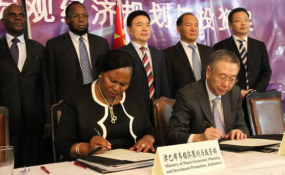
Photo: Innocent Mukawa/The Herald
Zimbabwe and China representatives signing the agreement (file photo).By Dumisani Ndlela
RELATIONS between Zimbabwe and China could sour after revelations nationals from the Asian country are mopping hard currency from the economy, creating a cash crisis that has triggered panic in government, the Financial Gazette can exclusively report.
China is considered an all-weather ally by President Robert Mugabe's government, which has been rocked by Western economic sanctions for nearly 15 years.
The cash crisis has been compounded by a dollar drain in the economy, created by an escalation of imports that has diminished the stock of money in the country.
Exports have been shrinking at a time imports have been soaring, forcing government to come up with a raft of measures that appear to have failed to make an impact in the wake of the alleged clean up of cash to offshore banks through the country's porous borders.
"They are taking the cash outside the country and depositing it with their bank in South Africa," a bank executive said this week.
His claim was corroborated by at least three other bankers who declined to be named.
George Guvamatanga, the managing director of Barclays Bank Zimbabwe, one of the largest importers of United States dollar notes in the country, said it was true "someone was taking the cash out of the country", but declined to say if it was the Chinese.
"We are bringing brand new notes into the country, but these notes are not coming back into the banking system as deposits. I can argue that someone is keeping these brand new notes, or taking them somewhere," Guvamatanga said.
Guvamatanga insisted the cash imported by banks and the central bank in the first quarter of this year was "adequate for our cash requirements".
During the first quarter of this year, the Reserve Bank of Zimbabwe (RBZ) imported US$145 million worth of notes, while banks imported an additional US$118 million in notes.
This, said Guvamatanga, was enough for Zimbabwe's "transactional purposes".
"The cash shortages are a reflection of a deep-seated problem; someone is taking the imported, brand new notes somewhere," he said.
RBZ governor, John Mangudya, said he was not in a position "to confirm the amounts or the nationalities of those hoarding and exporting cash from Zimbabwe," saying it was imperative to deal with the issue of cash externalisation "from a national perspective".
"The temptation of challenge of externalisation of cash or foreign exchange is high in economies like Zimbabwe that use foreign exchange as its domestic currency, especially at a time when business sentiment is low coupled by a strong US dollar and low productivity," Mangudya said in response to question from the Financial Gazette while attending the World Bank and International Monetary Fund Spring meetings in Washington.
He said as highlighted in his monetary policy statement in January, the country needed to come up with a "plug the leakages strategy" to enhance efficient utilisation of hard-earned foreign currency and ensure it did not "go out of the country on foot, transferred or remitted through banks or carried on person by people".
"On our part, we are putting in place measures to plug the leakages so that the cash we are importing to address the cash shortages remains or is retained in Zimbabwe. Other players like ZIMRA (Zimbabwe Revenue Authority), for example, would also need to play their part," he said.
A bank executive who declined to be named told the Financial Gazette: "This is no longer a secret. We have seen the Chinese from Zimbabwe with suitcases depositing cash with a Chinese bank in Johannesburg."
The Chinese bank in South Africa offers a full bouquet of products and services. It is also a deposit-taking institution.
Last month, a Chinese national with a bookstore in Murehwa was arrested at the Harare International Airport trying to externalise US$32 000 to China. The businessman, who was convicted by the courts, had hidden US$10 000 around his waist and US$20 000 inside his hand luggage. Only US$2 000 was in the wallet. He was fined US$200.
Mangudya said the fine imposed in this case did not help to address the challenge of externalisation.
"We also advocate the re-establishment of an Economic Crimes Court to deal with such matters," he said.
Chinese entrepreneurs have penetrated all economic sectors in Zimbabwe's fragile economy. They make bricks, bottled water, operate bookshops, and are also extensively involved in mining and the buying of precious minerals.
A source from the RBZ indicated that although there were many Chinese nationals operating gold mines, very few sold the minerals to Fidelity Printers and Refineries, an RBZ-owned gold buying company.
"It's not just the currency that you are talking about; it's also ivory and precious stones. A few of them have been arrested but the fines have not been deterrent," said the RBZ official, who spoke on condition of anonymity.
-- Allafrica
Zimbabwe and China representatives signing the agreement (file photo).By Dumisani Ndlela
RELATIONS between Zimbabwe and China could sour after revelations nationals from the Asian country are mopping hard currency from the economy, creating a cash crisis that has triggered panic in government, the Financial Gazette can exclusively report.
China is considered an all-weather ally by President Robert Mugabe's government, which has been rocked by Western economic sanctions for nearly 15 years.
The cash crisis has been compounded by a dollar drain in the economy, created by an escalation of imports that has diminished the stock of money in the country.
Exports have been shrinking at a time imports have been soaring, forcing government to come up with a raft of measures that appear to have failed to make an impact in the wake of the alleged clean up of cash to offshore banks through the country's porous borders.
"They are taking the cash outside the country and depositing it with their bank in South Africa," a bank executive said this week.
His claim was corroborated by at least three other bankers who declined to be named.
George Guvamatanga, the managing director of Barclays Bank Zimbabwe, one of the largest importers of United States dollar notes in the country, said it was true "someone was taking the cash out of the country", but declined to say if it was the Chinese.
"We are bringing brand new notes into the country, but these notes are not coming back into the banking system as deposits. I can argue that someone is keeping these brand new notes, or taking them somewhere," Guvamatanga said.
Guvamatanga insisted the cash imported by banks and the central bank in the first quarter of this year was "adequate for our cash requirements".
During the first quarter of this year, the Reserve Bank of Zimbabwe (RBZ) imported US$145 million worth of notes, while banks imported an additional US$118 million in notes.
This, said Guvamatanga, was enough for Zimbabwe's "transactional purposes".
"The cash shortages are a reflection of a deep-seated problem; someone is taking the imported, brand new notes somewhere," he said.
RBZ governor, John Mangudya, said he was not in a position "to confirm the amounts or the nationalities of those hoarding and exporting cash from Zimbabwe," saying it was imperative to deal with the issue of cash externalisation "from a national perspective".
"The temptation of challenge of externalisation of cash or foreign exchange is high in economies like Zimbabwe that use foreign exchange as its domestic currency, especially at a time when business sentiment is low coupled by a strong US dollar and low productivity," Mangudya said in response to question from the Financial Gazette while attending the World Bank and International Monetary Fund Spring meetings in Washington.
He said as highlighted in his monetary policy statement in January, the country needed to come up with a "plug the leakages strategy" to enhance efficient utilisation of hard-earned foreign currency and ensure it did not "go out of the country on foot, transferred or remitted through banks or carried on person by people".
"On our part, we are putting in place measures to plug the leakages so that the cash we are importing to address the cash shortages remains or is retained in Zimbabwe. Other players like ZIMRA (Zimbabwe Revenue Authority), for example, would also need to play their part," he said.
A bank executive who declined to be named told the Financial Gazette: "This is no longer a secret. We have seen the Chinese from Zimbabwe with suitcases depositing cash with a Chinese bank in Johannesburg."
The Chinese bank in South Africa offers a full bouquet of products and services. It is also a deposit-taking institution.
Last month, a Chinese national with a bookstore in Murehwa was arrested at the Harare International Airport trying to externalise US$32 000 to China. The businessman, who was convicted by the courts, had hidden US$10 000 around his waist and US$20 000 inside his hand luggage. Only US$2 000 was in the wallet. He was fined US$200.
Mangudya said the fine imposed in this case did not help to address the challenge of externalisation.
"We also advocate the re-establishment of an Economic Crimes Court to deal with such matters," he said.
Chinese entrepreneurs have penetrated all economic sectors in Zimbabwe's fragile economy. They make bricks, bottled water, operate bookshops, and are also extensively involved in mining and the buying of precious minerals.
A source from the RBZ indicated that although there were many Chinese nationals operating gold mines, very few sold the minerals to Fidelity Printers and Refineries, an RBZ-owned gold buying company.
"It's not just the currency that you are talking about; it's also ivory and precious stones. A few of them have been arrested but the fines have not been deterrent," said the RBZ official, who spoke on condition of anonymity.
-- Allafrica



